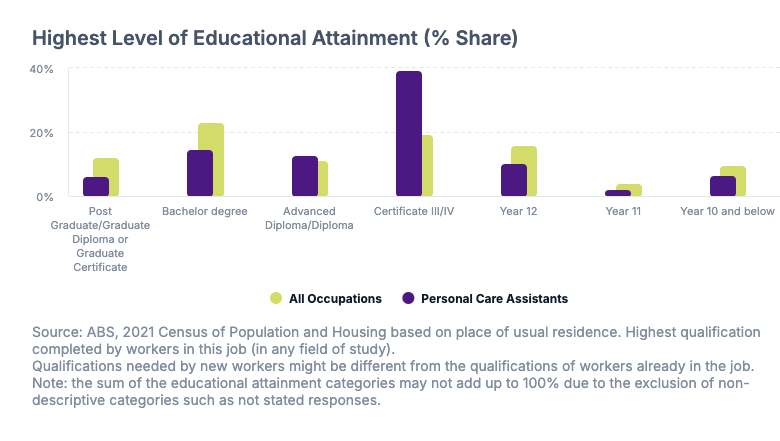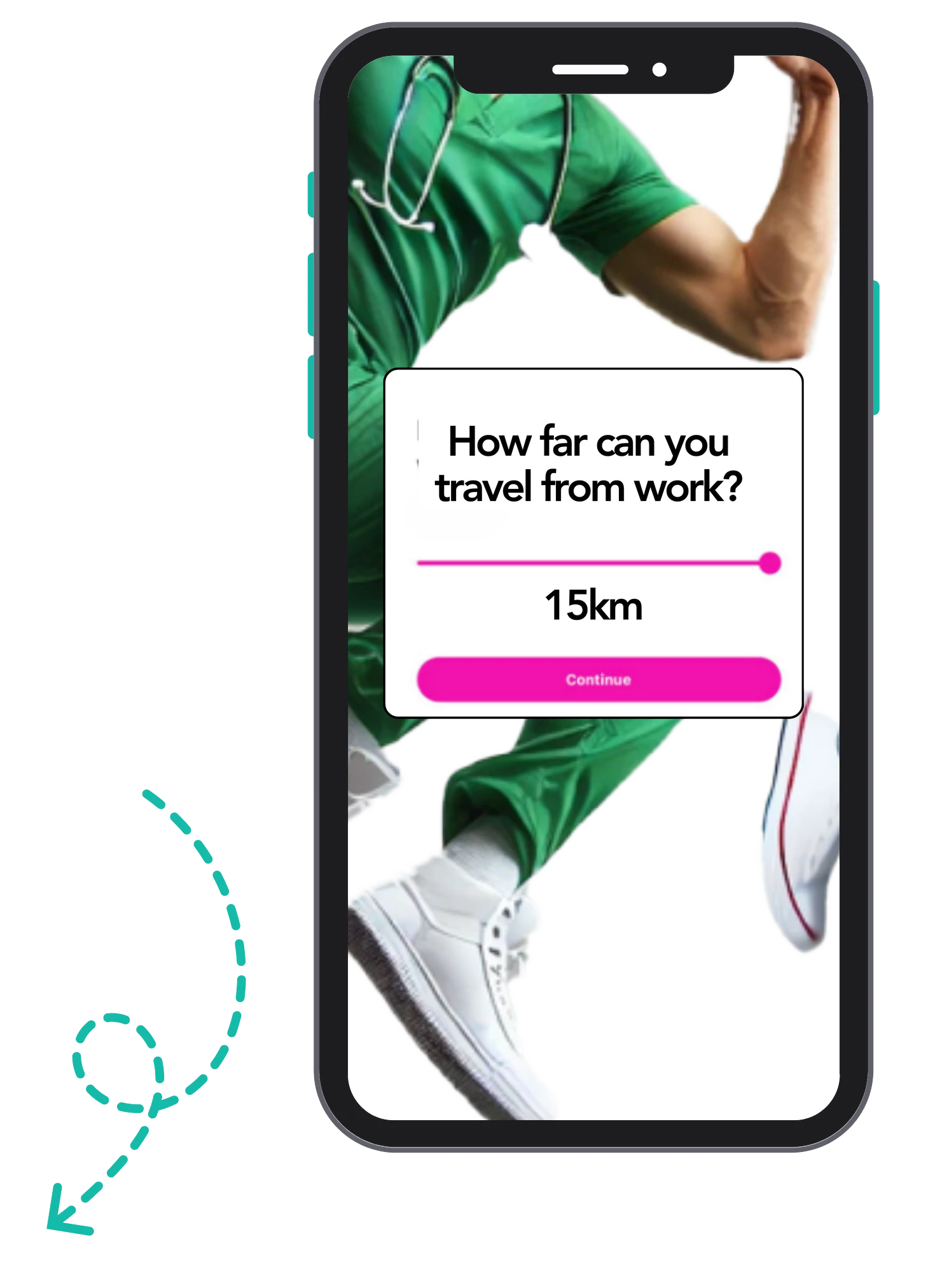A Personal Care Assistant (PCA) is a trained professional who supports older Australians, people with disabilities, or those recovering from illness, helping them with daily living activities and maintaining independence. PCAs work in homes, aged care facilities, and healthcare settings, providing essential care, companionship, and support to enhance clients’ quality of life.
In Australia, PCAs perform a range of important tasks, including mobility support, personal hygiene, participating in care planning, reporting changes in health, and assisting with rehabilitation. With aged care projected to be one of the fastest-growing areas of government spending, the demand for trained healthcare staff, including PCAs, continues to rise.
In this guide, we’ll focus on the important role of PCAs.
Personal Care Assistant Duties and Responsibilities
In this section, we delve into the core duties and responsibilities of Personal Care Assistants (PCAs), highlighting the essential tasks they perform to support older Australians, individuals with disabilities, and those recovering from illness, ensuring their well-being and independence
Personal Care & Hygiene
-
Assist clients with bathing, grooming, dressing, toileting, and maintaining personal hygiene
-
Help with mobility and transfers—such as moving from bed to chair—ensuring safety and compliance with care plans
-
Provide continence and skin care, oral hygiene, and support with behavioural, emotional, and sleep management in residential settings
Household & Daily Living Support
-
Perform light housekeeping tasks: cleaning, laundry, tidying, meal preparation, shopping, and errands
-
Assist with nutritious meal plans and support mealtime needs, ensuring dietary preferences and restrictions are considered
Medical & Care Coordination
-
Administer or support medication (only when trained) and follow care plans prescribed by healthcare professionals
-
Observe, document, and report changes in health, mood, behaviour, or condition to supervisors or medical staff
-
Support rehabilitation through mobility or exercise programs under supervision
Emotional & Social Support
-
Provide companionship, emotional reassurance, and social engagement to enhance quality of life
-
Encourage active participation in social and leisure activities, boosting emotional well-being
Administrative Support
-
Maintain accurate records of services delivered, observations, and client progress
-
Workign with families, nurses and other healthcare professionals and acting as a key point of contact.
Mobility & Transport
-
Helping clients move around, including from beds to chairs or wheelchairs
-
Accompany clients to appointments or outings, assist with transport and scheduling as needed
Skills and Qualifications Required
Let’s take some time to consider the PCA job requirements, qualifications, and skills you’ll need to succeed in this brilliantly rewarding role.
Soft skills : A PCA must show:
- Empathy and patience when dealing with older people.
- Strong communication techniques, such as switching from speaking to patients to other healthcare practitioners.
- Attention to detail such as remembering how a patient likes to be addressed, or what their grooming routine is.
Technical skills :
- You’ll need the requisite PCA qualifications.
- Knowledge of basic healthcare practices, and manual handling techniques.
Certifications and PCA courses required for a Personal Care job
Whilst there are no minimum standard qualifications for entry-level care workers, all organisations require that PCAs have the following certificate:
Some essential screening checks must be undertaken before you can work as a PCA. For instance, you’ll need a Police Check. These are a mandatory requirement. It’s also a good idea to have an up-to-date First Aid Certificate, too. Lastly, if you’re training to become a PCA and you’re from overseas, you must have the right to live and work in Australia.

How Much Does a Personal Care Assistant Earn in Australia?
A PCA is paid differently based on a number of factors. However we’ll assess the PCA salary in Australia based on market data and averages.
- Hourly salary range for PCAs: The latest data shows that you can earn between AUD 29–35 per hour.
- Factors influencing salary: What you earn will depend on your location, experience, qualifications, and whether you’re employed full-time, part-time, or casually
Benefits and additional perks: There are a host of benefits to working in a PCA role. These can include factors such as shift loading and weekend pay. You’ll also have job stability, as there will always be sectors of society that need help and care.
Career Pathways and Opportunities for Growth
Personal care assistants (PCAs) in Australia have various career pathways, ranging from advancing into leadership and specialist roles within aged care and healthcare to transitioning into other allied health or community sector positions.
Entry-Level and Standard Progression
-
Start as PCA: Most begin their careers after completing a Certificate III in Individual Support (Ageing, Disability, or Home and Community).
-
Home Care Assistant & Residential Care Worker: Common first roles for new graduates, either in private homes or aged care facilities.
Mid-Level Pathways
-
Senior PCA or Team Leader: By gaining experience and completing a Certificate IV in Ageing Support or Disability, a PCA can take on supervisory roles, mentor junior staff, and help manage care teams.
-
Lifestyle or Activities Coordinator: These roles focus on planning and implementing resident activities and programs, accessible after relevant vocational training.
Specialist and Advanced Roles
-
Care Manager/Coordinator: With further studies such as an Advanced Diploma of Community Sector Management, PCAs can oversee larger care programs, manage facilities, or coordinate care services.
-
Disability Services Manager: For those with experience and advanced qualifications, opportunities exist within disability support and management roles.
-
Aboriginal Health Worker: With specific certificates, PCAs may transition into community health roles, working with First Nations peoples.
Other Career Routes
-
Further Study: Some PCAs pursue nursing qualifications (Diploma of Nursing, Bachelor of Nursing) to become Enrolled Nurses (EN) or Registered Nurses (RN).
-
Mentorship/Education: Experienced carers may become industry mentors or trainers within their organisations or vocational colleges.
Progression depends largely on additional qualifications, experience, and a commitment to ongoing education and training in the sector.
The Demand for PCAs and Future Job Opportunities
As of 2024, just under 15% of the Australian population is made up of people aged 65 and over. Over the next few years, this is expected to increase.
With this comes the rising demand for aged care workers who can provide a superior level of support to an ageing cohort.
There are various government initiatives in place and funding for aged care workforce development over the next few years with the introduction of the New Aged Care Act.
Moving into this sector provides you with real job security. There is growth potential for anyone coming into the healthcare profession at this level. You can choose to stay in a PCA role or gravitate towards nursing care.
The way healthcare is delivered is also changing at pace. We’re now utilising technology more than ever to deliver targeted, direct services to patients in their own homes. This means they can age in place safely if they wish.
The advent of consumer-directed care models also means that older people have more of a say in how they would like to be cared for. PCAs can therefore work in patient’s homes or within care and hospital facilities.
How to Get Started as a Personal Care Assistant
Here’s a summary on how you can get started on the career path to becoming a PCA in Australia.
- Enrol in relevant training courses
- Obtain certifications and qualifications
- Apply for the correct police screening checks
- Gain practical experience with internships or volunteer opportunities
- Apply for PCA roles via hopstep mobile app
Register with hopstep today to find your perfect match!

Take the Next Step to Become a PCA in Australia
The benefits working as a PCA can bring are many. You’ll enjoy rewarding, meaningful work, there’s job stability, and always opportunities for career growth and development as you gain experience.
Why not consider exploring aged care as a rewarding career option? You can find more information on finding a job as a healthcare professional in Australia via the Government’s website.
When you’re ready to start your role in healthcare, we’re with you every hopstep of the way. See how we can assist.
